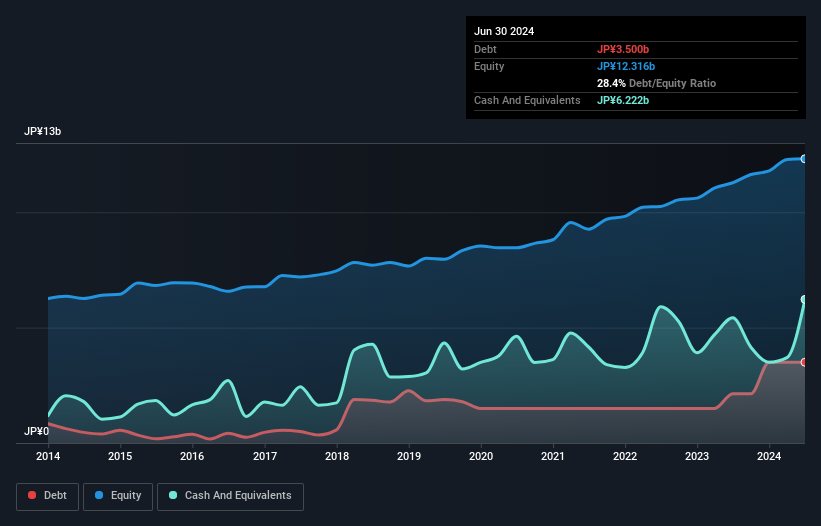Is Ryomo SystemsLtd (TSE:9691) A Risky Investment?
The external fund manager backed by Berkshire Hathaway's Charlie Munger, Li Lu, makes no bones about it when he says 'The biggest investment risk is not the volatility of prices, but whether you will suffer a permanent loss of capital.' When we think about how risky a company is, we always like to look at its use of debt, since debt overload can lead to ruin. We can see that Ryomo Systems Co.,Ltd. (TSE:9691) does use debt in its business. But the more important question is: how much risk is that debt creating?
Why Does Debt Bring Risk?
Debt is a tool to help businesses grow, but if a business is incapable of paying off its lenders, then it exists at their mercy. Part and parcel of capitalism is the process of 'creative destruction' where failed businesses are mercilessly liquidated by their bankers. However, a more usual (but still expensive) situation is where a company must dilute shareholders at a cheap share price simply to get debt under control. By replacing dilution, though, debt can be an extremely good tool for businesses that need capital to invest in growth at high rates of return. When we think about a company's use of debt, we first look at cash and debt together.
See our latest analysis for Ryomo SystemsLtd
What Is Ryomo SystemsLtd's Net Debt?
You can click the graphic below for the historical numbers, but it shows that as of June 2024 Ryomo SystemsLtd had JP¥3.50b of debt, an increase on JP¥2.14b, over one year. But it also has JP¥6.22b in cash to offset that, meaning it has JP¥2.72b net cash.

How Healthy Is Ryomo SystemsLtd's Balance Sheet?
According to the last reported balance sheet, Ryomo SystemsLtd had liabilities of JP¥8.33b due within 12 months, and liabilities of JP¥2.17b due beyond 12 months. On the other hand, it had cash of JP¥6.22b and JP¥3.00b worth of receivables due within a year. So it has liabilities totalling JP¥1.28b more than its cash and near-term receivables, combined.
Of course, Ryomo SystemsLtd has a market capitalization of JP¥8.09b, so these liabilities are probably manageable. However, we do think it is worth keeping an eye on its balance sheet strength, as it may change over time. Despite its noteworthy liabilities, Ryomo SystemsLtd boasts net cash, so it's fair to say it does not have a heavy debt load!
But the bad news is that Ryomo SystemsLtd has seen its EBIT plunge 20% in the last twelve months. If that rate of decline in earnings continues, the company could find itself in a tight spot. There's no doubt that we learn most about debt from the balance sheet. But it is Ryomo SystemsLtd's earnings that will influence how the balance sheet holds up in the future. So if you're keen to discover more about its earnings, it might be worth checking out this graph of its long term earnings trend.
Finally, a business needs free cash flow to pay off debt; accounting profits just don't cut it. While Ryomo SystemsLtd has net cash on its balance sheet, it's still worth taking a look at its ability to convert earnings before interest and tax (EBIT) to free cash flow, to help us understand how quickly it is building (or eroding) that cash balance. During the last three years, Ryomo SystemsLtd burned a lot of cash. While that may be a result of expenditure for growth, it does make the debt far more risky.
Summing Up
While Ryomo SystemsLtd does have more liabilities than liquid assets, it also has net cash of JP¥2.72b. So although we see some areas for improvement, we're not too worried about Ryomo SystemsLtd's balance sheet. There's no doubt that we learn most about debt from the balance sheet. However, not all investment risk resides within the balance sheet - far from it. For instance, we've identified 4 warning signs for Ryomo SystemsLtd (2 are a bit concerning) you should be aware of.
Of course, if you're the type of investor who prefers buying stocks without the burden of debt, then don't hesitate to discover our exclusive list of net cash growth stocks, today.
Have feedback on this article? Concerned about the content? Get in touch with us directly. Alternatively, email editorial-team (at) simplywallst.com.
This article by Simply Wall St is general in nature. We provide commentary based on historical data and analyst forecasts only using an unbiased methodology and our articles are not intended to be financial advice. It does not constitute a recommendation to buy or sell any stock, and does not take account of your objectives, or your financial situation. We aim to bring you long-term focused analysis driven by fundamental data. Note that our analysis may not factor in the latest price-sensitive company announcements or qualitative material. Simply Wall St has no position in any stocks mentioned.
 Index Options
Index Options CME Group
CME Group Nasdaq
Nasdaq Cboe
Cboe TradingView
TradingView Wall Street Journal
Wall Street Journal